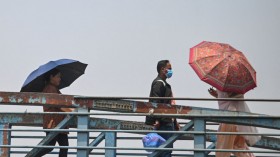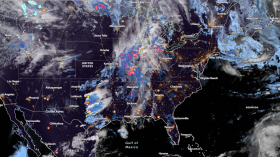An extreme heat wave has impacted Africa's Sahel region since early this year, resulting in mass human fatalities as temperatures reached a record high. Affected countries include Mali, Guinea, Senegal, Burkina Faso, Chad, Niger, and Nigeria, where reported temperatures had spiked as high as 45 degrees Celsius. The temperatures are 1.5 Celsius hotter than average, according to reports.
While the scorching heat seemed like a relatively ordinary natural disaster, the deadly Sahel heat wave has caught the attention of the scientific community and other experts. In a new study, scientists argue that the extreme heat the region experienced from late March to early April is "impossible" without the influence of anthropogenic or human-induced climate change.
Sahel Heat Wave
![Extreme Heat Wave in Africa’s Sahel Region That Killed 100 People Linked to Climate Change [Study] Extreme Heat Wave in Africa’s Sahel Region That Killed 100 People Linked to Climate Change [Study]](https://1471793142.rsc.cdn77.org/data/images/full/70226/extreme-heat-wave-in-africa-s-sahel-region-that-killed-100-people-linked-to-climate-change-study.jpg?w=820)
(Photo : Photo by Michel Isamuna on Unsplash)
During a televised interview in Mali, Professor Diango Djibo, from Bamako's Gabriel Toure hospital, stated that a total of 102 people died in the facility's intensive care unit. The deaths happened during the first four days of April this year amid the Sahel heat wave that impacted not only Mali but also other countries across West Africa, the Red Cross Red Crescent Climate Centre reported.
Last month, the temperatures in Mali surpassed 48 degrees Celsius and more than 45 Celsius in Burkina Faso between April 1 and April 5, according to a study by the World Weather Attribution (WWA). This extreme heat is likely the reason behind the numerous deaths, according to the new research paper. The WWA is an international scientific team that focuses on extreme weather events.
Also Read: Madagascar Heatwave: Impact of Global Heat Among Populations Unrecorded
Anthropogenic Climate Change
In the paper published in the website of the WWA on Thursday, April 18, scientists assert the extreme Sahel heat wave that struck a highly-vulnerable population would not be possible without anthropogenic climate change. During the end of the recent Ramadan, by the end of March and beginning of April, the unprecedented heat blanketed the Sahel and West Africa.
While heat waves are considered to be arguably the deadliest type of extreme weather event, this is the first time in recorded history that a heat wave of such magnitude occurred in the region. The natural disaster, coinciding with power cuts in many countries across the African region, also made it difficult for the local population to cope with the extreme temperatures, according to the WWA.
Climate Change and Heat Waves
The findings relating to climate change and the Sahel heat wave came from WWA's international coalition of scientists from the United States, the United Kingdom, the Netherlands, Mali, Burkina Faso, Mozambique, and Sweden.
This is not the first time that the current climate crisis has been linked to heat waves. In September 2023, the World Meteorological Organization (WMO) cited a report, showing human-caused climate change has increased the frequency and intensity of heat waves since the 1950s.
According to the WMO, heat waves are dangerous since it amplifies the impact of drought, wildfire, water insecurity, power shortages, and agricultural losses.
Related Article: Climate Change Slows Heat Waves, Exposing Humans To Extreme Temperature Longer
© 2024 NatureWorldNews.com All rights reserved. Do not reproduce without permission.





